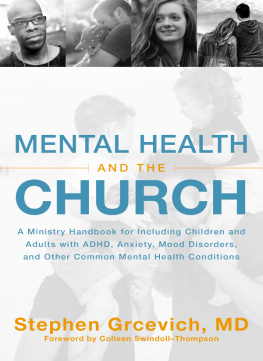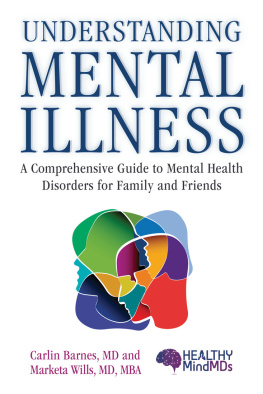Sommaire
Pagination de l'dition papier
Guide
grace for the children
FINDING HOPE IN THE MIDST OF CHILD
AND ADOLESCENT MENTAL ILLNESS
Matthew S. Stanford
InterVarsity Press
P.O. Box 1400, Downers Grove, IL 60515-1426
ivpress.com
email@ivpress.com
2019 by Matthew S. Stanford
All rights reserved. No part of this book may be reproduced in any form without written permission from InterVarsity Press.
InterVarsity Press is the book-publishing division of InterVarsity Christian Fellowship/USA, a movement of students and faculty active on campus at hundreds of universities, colleges, and schools of nursing in the United States of America, and a member movement of the International Fellowship of Evangelical Students. For information about local and regional activities, visit intervarsity.org.
All Scripture quotations, unless otherwise indicated, are taken from the New American Standard Bible, copyright 1960, 1962, 1963, 1968, 1971, 1972, 1973, 1975, 1977, 1995 by The Lockman Foundation. Used by permission.
While any stories in this book are true, some names and identifying information may have been changed to protect the privacy of individuals.
Significant parts of this book have been published previously on the Mental Health Gateway website (mentalhealthgateway.org) of which Matthew S. Stanford is the CEO; Mental Health Grace Alliance (mentalhealthgracealliance.org), of which Matthew S. Stanford is a cofounder; and Matthew S. Stanfords blog, Mindful of Grace (mindfulofgrace.blogspot.com). Used with permission.
Cover design and image composite: Cindy Kiple
Interior design: Jeanna Wiggins
Images: girl running: Mary Wethey / Trevillion Images
girl running: Mark Owen / Trevillion Images
mother and child hands: Milkos / iStock / Getty Images Plus
ISBN 978-0-8308-5791-3 (digital)
ISBN 978-0-8308-4576-7 (print)
This digital document has been produced by Nord Compo.
Behold, children are a gift of the LORD, the fruit of the womb is a reward.
PSALM 127:3
O NE OF MY PASSIONS is training pastors and ministry staff to recognize and respond to the mental-health problems of those they are serving. At the end of my workshops, we always have a question and answer time, and during one of these sessions a young pastor raised her hand. She wanted to know the best way to minister to a new family that had recently started attending her church.
Ross, Ellen, and their two children, Ashley and Charlie, moved to the area three years ago. At that time Charlie had just turned five and was beginning kindergarten while Ashley was going into the second grade. The family was interested in attending a small Bible church near their home, so Ellen made an appointment with the childrens minister to discuss Charlie. In the year prior to their move Charlie had been diagnosed with mild autism, and while he was a happy, carefree little boy he did have trouble sitting still and tended to wander. The childrens minister assured Ellen that the Sunday school staff could accommodate Charlie, and he was welcomed with open arms.
Most Sunday mornings that first year Charlie did fine, but at least once a month one of his parents had to be caslled out of the service to get him. At school the academic and behavioral demands of kindergarten were simply too much for Charlie, and he quickly fell behind. Frustrated, he began acting out. By the middle of the year he had been moved to a special education class. Over the next two years Charlies behavior on Sunday mornings deteriorated. He would pace around the class and refuse to sit down. When frustrated he would yell and disrupt the class. His yelling was often so loud that he could be heard in the service. In first grade Charlie was given an additional diagnosis of Attentional Deficit Hyperactivity Disorder.
Many Sundays either Ellen or Ross would stay home with Charlie so the other parent could attend church with Ashley. Charlies behavioral problems were taking a toll on the family. They felt isolated and alone. One Sunday morning Charlie bit his Sunday school teacher when she was trying to restrain him. Charlie was prescribed medication by a child psychiatrist to help control his impulsive behavior. On several occasions the childrens minister met with Ellen and Ross, but it was clear that she considered Charlie the bad kid and saw his behavior the result of willful disobedience rather than a neurodevelopmental disorder. The churchs response to Charlie was more disciplinary than accommodating.
Things reached a head one Sunday morning when Charlie, now seven, threw a toy at another child, causing a large laceration on the girls forehead. To remedy the problem, the churchs leadership sought a restraining order against Charlie so that he could not attend. This was done without consulting Ellen and Ross, who found out about the restraining order when a constable delivered court documents to their home one afternoon. Now seriously wounded by the body of Christ, this broken family was seeking refuge at a new church. The twenty or so pastors in the room at my workshop were speechless.
How could anyone imagine that a restraining order against a suffering child and struggling family expresses the unconditional love and limitless grace of Christ? But this type of harmful response to mental illness is not uncommon in the church. My own research on Christians with mental illness demonstrates that 30-40 percent of them have had a negative interaction (such as having a pastor tell them there is no such thing as mental illness) when they seek counseling or assistance from their church in relation to their disorder.
Mental illness is a terrifying experience, especially when a father and mother have to watch their child suffer from destructive, uncontrollable thoughts, feelings, and behaviors. Given Jesus heart for children (Matthew 19:13-15; Mark 10:13-16; Luke 18:15-17), the church should be a place of grace and unconditional love for families struggling to care for a child with mental illness. Unfortunately, due to fear and spiritual ignorance, the church has struggled in ministering to these families. It is my hope that the information presented in this book will provide a better understanding of mental illness, both from a scientific perspective and through the eyes of faith. To truly minister to suffering children and their families the way that Christ would, we must see them with his eyes. So lets start by understanding Gods creative role in the birth of all children.
THE HANDS OF THE MAKER
All children are fearfully and wonderfully made in the image of God (Genesis 1:26). A creative act similar to the creation of Adam is repeated at the origin of each person. God wills that each individual life comes into existence and actively sustains them moment by moment (Colossians 1:16-17). God knits all children together in their mothers wombs (Psalm 139:13-16), and they are alleven those with developmental and psychological disordersconceived for the purpose of displaying his glory (Isaiah 43:7). God is intentional in the creation of his children (Psalm 119:73), endowing each with a divine purpose and plan (Jeremiah 29:11) and bestowing them as a gift and reward upon their earthly parents (Psalm 127:3). Even before a child is conceived, God knows everything about them and longs for an intimate relationship with them (Psalm 139:16; Jeremiah 1:5; Ephesians 1:4-5). The Scriptures tell us that it is beyond our finite minds to fully grasp this divine process (Ecclesiastes 11:5), but we should rest in the fact that God is intentional and intimately involved in the creation of every new life.











